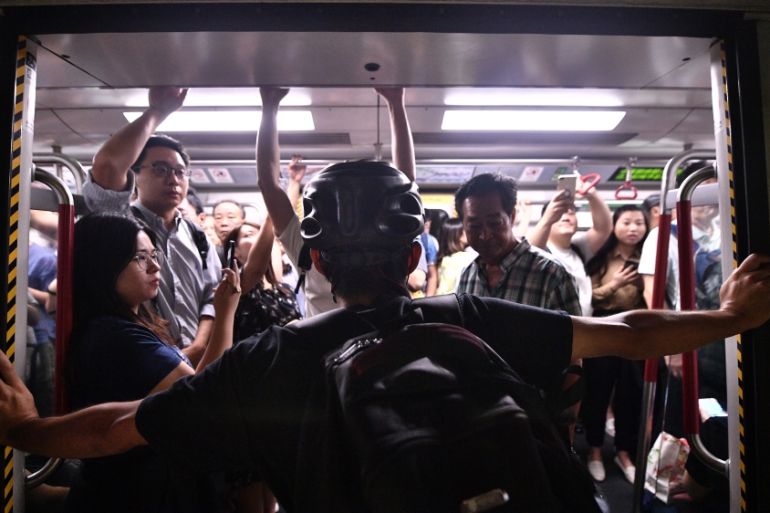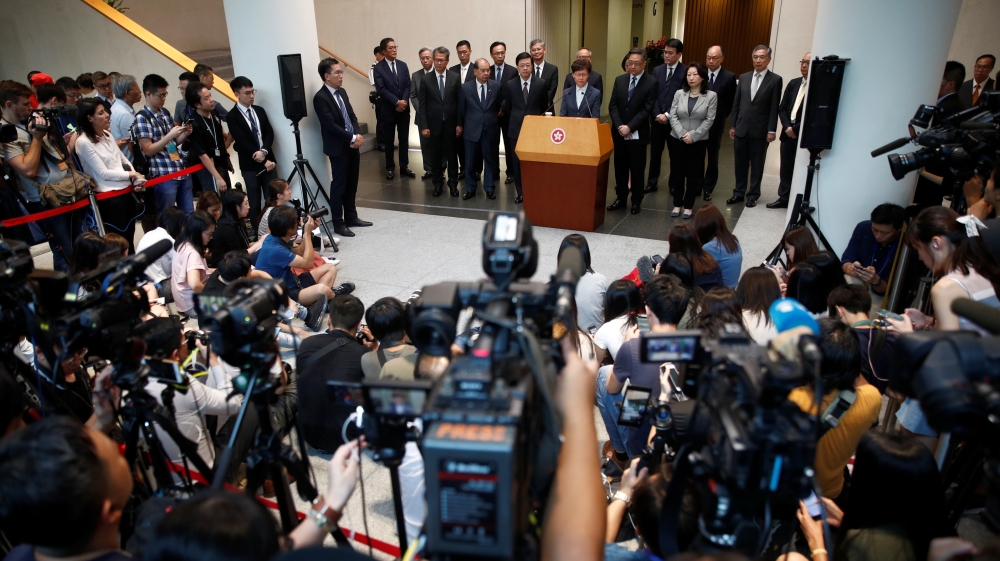Protesters paralyse Hong Kong with citywide strike
Police arrest over 80 people as chief executive Lam warns of ‘dangerous path’ after parts of Hong Kong left crippled.

Pro-democracy protesters in Hong Kong have launched a rare citywide strike, crippling parts of the city, as the semi-autonomous territory’s Chief Executive Carrie Lam warned the demonstrations are heading in a “dangerous path”.
Hong Kong police arrested a record 82 people on Monday. At least eight railway lines, including the airport express, were shut fully or partly. Several protesters were seen blocking entrances to the commuter trains, occasionally leading to fighting with other passengers rushing to their destinations.
Keep reading
list of 4 itemsThe Take: Where are Hong Kong’s protesters now?
Hong Kong’s new security law comes into force amid human rights concerns
Hong Kong passes tough new national security law
An estimated 200 flights were also cancelled on Monday, and only one of two runways in the city’s main airport is operating. Media reports blamed it on aviation workers joining the strike.
A number of protesters also tried to block traffic, causing brief congestion before authorities came to clear the streets of steel and plastic barriers.
Hong Kong police claim to have arrested 420 protesters since June 9, on charges including rioting, unlawful assembly, possessing offensive weapons, assaulting officers and obstructing police operations.
|
|
It was also reported that at least 14,000 people from more than 20 sectors committed to the strike, according to organisers – many hiding behind masks for fear of reprisal.
People also indicated their plans online to either strike or phone in sick on Monday – from civil servants and social workers to flight attendants, pilots, bus drivers and even employees of the city’s Disneyland.
Al Jazeera’s Andrew Thomas, reporting from Hong Kong, said that many of the streets in the city were empty.
“This is a city where there’s very little, it feels anyway, economic activity going on at the moment,” he said.
In a press conference on Monday morning, Lam said the protests “challenge ‘one country, two systems’ and threaten Hong Kong’s prosperity and stability”.
“The government will be resolute in maintaining law and order of Hong Kong and restoring confidence.”
The protest movement is experimenting with more varied civil disobedience techniques after huge rallies failed to move Beijing.

The semi-autonomous southern Chinese city has witnessed two months of unprecedented protests and clashes triggered by opposition to a planned extradition law that quickly evolved into a wider movement for democratic reform and a halt to sliding freedoms.
On Sunday night, different districts of the city were filled with the sound of protesters erecting and, just as hastily, taking down their improvised barricades.
Throughout the weekend, riot police fired tear gas as they confronted the protesters.
On Saturday, police detained a 36-year-old Filipino and a 26-year-old South Korean worker for taking part in the protest, according to the South China Morning Post. They are the first two foreigners arrested since the demonstrations began.
Police spokesperson Yolanda Yu Hoi-kwan told reporters on Monday that more than 300 non-lethal bullets and around 1,000 tear gas grenades had been fired.
Yu said 139 officers had been injured in clashes, with two still hospitalised with fractures.
Protesters took over a major road outside the main government office on Monday, allegedly throwing eggs and bricks at the building, and puncturing large water-filled barriers set up by police to keep them away.

Authorities in Hong Kong and Beijing have signalled a hardening stance, with the Chinese military saying it is ready to quell the “intolerable” unrest if requested.
The largely leaderless protest movement uses social messaging apps to coordinate and the strike action appears to be gaining more traction than previous strike calls in the last few weeks.
‘Psychological barrier’
Given its reputation as a bastion for free-market capitalism, Hong Kong has little recent history of successful labour movements.
“There’s a psychological barrier for people to strike,” protester and pastor Monica Wong, 40, told the AFP news agency on Sunday, at a large rally.
“I really understand how some people will face huge pressures from their supervisors,” she said.
Kong Girl.
Credit: Lam Yik Fei for The New York Times #HongKong pic.twitter.com/a3gMYL4RN0
— Ray Kwong (@raykwong) August 4, 2019
Alongside the strike, protesters are planning to hold rallies in seven different parts of the city, as protests continue for a fourth day running.
The past two weeks have seen a surge in violence on both sides with police repeatedly firing rubber bullets and tear gas to disperse increasingly hostile projectile-throwing crowds.
A group of men suspected to be linked to triads – Hong Kong’s notorious gangsters – also attacked demonstrators, putting 45 people in hospital.
|
|
Under the terms of the 1997 handover deal with Britain, Hong Kong has rights and liberties unseen on the Chinese mainland, including an independent judiciary and freedom of speech.
But many say those rights are being curtailed, citing the disappearance into mainland custody of dissident booksellers, the disqualification of prominent politicians and the jailing of pro-democracy protest leaders.
Public anger has been compounded by rising inequality and the perception that the city’s distinct language and culture are being threatened by ever-closer integration with the Chinese mainland.
Hong Kong’s leader Lam has made few concessions beyond agreeing to suspend the extradition bill, and has shied away from public appearances.
Protesters are demanding her resignation, an independent inquiry into police tactics, an amnesty for those arrested, a permanent withdrawal of the bill and the right to elect their leaders.